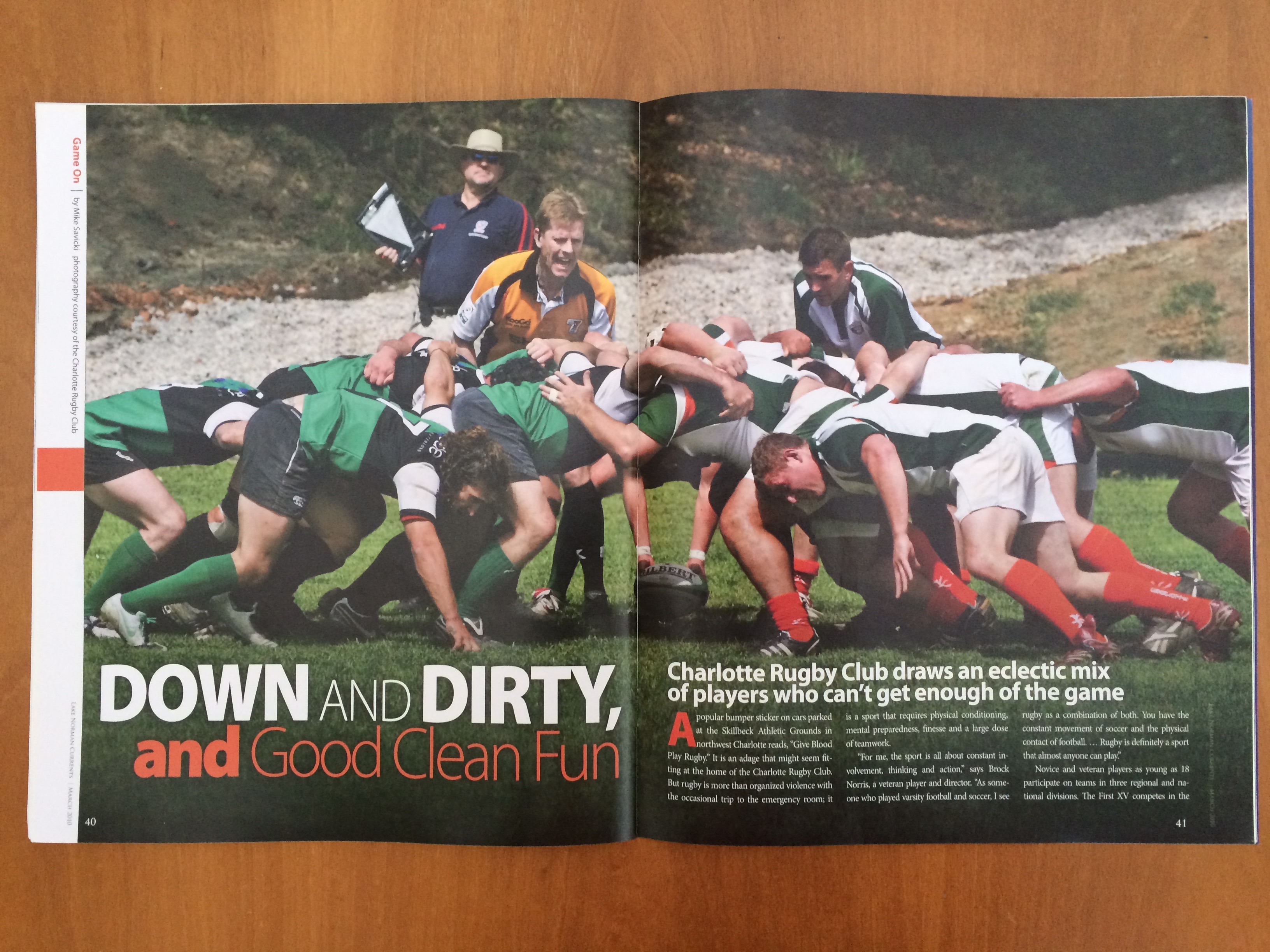Down and Dirty, and Good Clean Fun
Charlotte Rugby Club draws an eclectic mix of players who can’t get enough of the game
By Mike Savicki
A popular bumper sticker on cars parked at the Skillbeck Athletic Grounds in northwest Charlotte reads, Give Blood Play Rugby. To the uneducated eye, it is an adage that might seem fitting at the home of the Charlotte Rugby Club. But the sport of rugby is more than organized violence with the occasional trip to the emergency room; it is a sport that requires physical conditioning, mental preparedness, finesse and a large dosage of teamwork.
“For me, the sport is all about constant involvement, thinking and action,” says Brock Norris, a veteran player and director. “As someone who played varsity football and soccer, I see rugby as a combination of both. You have the constant movement of soccer and the physical contact of football. And then there is the vertical aspect that makes it appealing to basketball players. Rugby is definitely a sport that almost anyone can play.”
Founded in 1971, the Charlotte Rugby Club has a longstanding reputation as one of the nation’s top rugby clubs. Novice and veteran players as young as age 18 participate on teams in three regional and national divisions. The First XV competes in the USA Rugby Super League, which is comprised of the top rugby teams in the nation. The Second XV competes in the USA Rugby South Division II league. The Third XV, named The Charlotte Socialites, plays primarily in friendly matches throughout the Carolinas.
Brock Norris says the “Socialites” is just like it sounds. He explains, “They are our social team who come out and play together instead of practicing. Players range in age up through their fifties and are basically in it for fun.”
The Super League side is comprised of competitive players from the Charlotte region as well as Ireland, England and South Africa. As the Super League’s 2010 spring season begins, Charlotte Rugby is boosting its strength with four recruits from England, Australia and South Africa. “Competing at the highest level requires a complete understanding of the game, and our recruits bring that to Charlotte,” Norris adds.
Young bloods
Joe Cowley and Jeff Calvo are two of the Charlotte Rugby Club’s younger players who share local ties and big aspirations. The pair both played at Charlotte Catholic High School and are now training for positions on the club’s Super League team. While their jobs on the field are quite different, their love of the game is similar.
“I started playing rugby in England when I was five,” Joe Cowley explains. “I came to the United States four and a half years ago for my Dad’s job and found that this club has a friendly mixture of young and old players. Everyone gets along, and that says a lot in a sport that can be pretty competitive.” Cowley, an age standout player for USA Rugby who has hopes of one day playing for the national side, is a fullback. He says his job on the field is to provide the last line of defense and score as often as possible.
Jeff Calvo grew up in Charlotte playing lacrosse and football. He was introduced to rugby during his senior year at Charlotte Catholic and has played for the Charlotte Rugby Club for four years. “I’m a prop and my job is similar to what a lineman does in football. I’m in the front row of the scrum and I’m the guy who does all the dirty work,” Calvo says.
In the fall of 2008, Charlotte Rugby Club formed a formal partnership with the North Carolina High School Rugby Association (NCHRA). This partnership is working to boost the sport of rugby in Charlotte as well as the surrounding areas. Eight area teams now participate, including the Charlotte Catholic Cougars, who are a top 10 team in the United States.
“Because of the increasing popularity of the game at the high school and college levels, the average age of our top team has dropped,” Brock Norris explains. “If you include all the area high school players as well as our social players, our membership is now over four hundred.”
Competition and camaraderie
While competition fuels the players, camaraderie brings them together. “Off the field, we are construction workers, doctors and lawyers, but when we put on our uniforms, we are all rugby players,” says Brock Norris. “When I was introduced to the sport at Appalachian State, I found the team aspect and club atmosphere most appealing. And when I graduated, rugby was one of the main reasons I came to Charlotte.”
Brock Norris says that those who might be interested in learning more about the game should simply come out to the field on a Saturday when the team is at home. “Every Saturday that we have a match at home, we begin the day with high school rugby,” he says. “The second side then typically plays before the Super League side. Along with those who come to watch international rugby on television, we might get as many as one thousand people here throughout the day.”
The Scoop
A spectator’s guide to rugby
Rugby is the precursor to American football and has been played in the United States since 1870. Rugby is a fast-paced, full contact sport with few stoppages and continuous possession changes. All players on the field, regardless of position, can run, pass, kick and catch the ball. Each player competes on offense as well as defense. There are four ways to score and earn points. A try, similar to a touchdown, is worth five points. Following a try, a successful conversion kick earns two additional points. If a team is within range of the goalposts, a penalty kick or a drop kick earns three points. Players scrum, tackle, ruck and maul during the course of the match. The sport is played by both men and women.
This article was originally published in the March 2010 edition of Currents Magazine.

